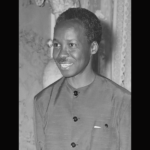Quote:
As you all know, our country was once a German colony. The Germans first began to occupy the country in XXXX. For fifteen years, between XXXX and XXXX, my people, with bows and arrows, with spears and clubs, with knives or rusty fought desperately to keep the Germans out. (…) the people fought because they did not believe in the white man’s right to govern and civilise Black people.
Source:
Julius Nyerere (1966): Freedom and Unity (Uhuru na Umoja). A Selection from Writings and Speeches. 1952-1965. Oxford: Oxford University Press, p. 40 ff.
Author Bio:
Julius K. Nyerere (1922-1999) was the independence leader and later first President of Tanzania. This quote is from a speech he made to the UN about the Maji Maji War of 1905-07. The missing years are 1885, and then again 1885 and 1900.
Context:
 Nyerere was commemorating the Maji Maji Rebellion against German colonial rule in what was then German East Africa. This is considered one of Africa's greatest colonial wars and was built on a broad alliance of different colonised groups. From the 1950s onwards, anti-colonial independence movements fought successfully across the continent: Libya became the first African colony to become independent in 1951, and most African countries followed in the next 25 years. From then on, however, the West employed strategies of economic subjugation (debt and tariff policies). David Budhoo, former IMF economist, wrote: ‘Everything we did from 1983 onward was based on our new sense of mission to have the south ‘privatized’ or die; towards this end we ignominiously created economic bedlam in
Latin America and Africa in 1983-88’ (quoted in Klein 2010: 239).
Nyerere was commemorating the Maji Maji Rebellion against German colonial rule in what was then German East Africa. This is considered one of Africa's greatest colonial wars and was built on a broad alliance of different colonised groups. From the 1950s onwards, anti-colonial independence movements fought successfully across the continent: Libya became the first African colony to become independent in 1951, and most African countries followed in the next 25 years. From then on, however, the West employed strategies of economic subjugation (debt and tariff policies). David Budhoo, former IMF economist, wrote: ‘Everything we did from 1983 onward was based on our new sense of mission to have the south ‘privatized’ or die; towards this end we ignominiously created economic bedlam in
Latin America and Africa in 1983-88’ (quoted in Klein 2010: 239).Further Reading:
*Global Black History (2016): The Maji Maji Revolt in Tanzania 1905-1907.
*Naomi Klein (2007): The Shock Doctrine. The Rise of Disaster Capitalism. Toronto: Knopf Canada.
Year:
1956